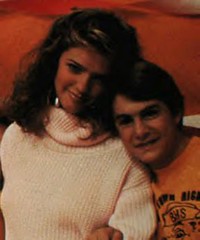One movie that has certainly been overlooked from a pyschological perspective is "Teen Wolf." It's not unreasonable to think co-writers Jeph Loeb and Matthew Weisman will be looked at a century from now as Van Gogh-type figures - geniuses that were placed on this earth too soon for their time. And here's the crux of my argument: there's a lot more going on than meets the eye in that movie. Way before M. Night Shyamalan made this trick standard practice, Loeb and Weisman toyed with the audience's idea of reality: is what we're seeing on the screen what's "really" happening, or are we seeing a reality based upon on the mindset of the protaganist?
This isn't to argue that Scott Howard and his father Harold weren't truly werewolves - of that there is no doubt. No mere mortal could pull off a handstand like that on top of a moving van. No, the question involves a much overlooked character that is crucial to bringing Howard's out-of-control ego back down to earth and making him realize that despite his superhuman strength and chest hair, he's really just a teenager that should be himself - and that character is Lewis.
The question that is sure to be debated by our children and our children's children is this: was Lewis a real person involved in Scott Howard's life, or is he just a figment of Howard's twisted conscience? Scholars at top universities are beginning to formulate detailed theses arguing that Lewis never existed in a physical sense, instead representing the sense of balance and rationality missing in Scott's mind.
Remember the scene when Scott is wolfed out walking through the halls, and says hi to Lewis, only to be greeted by a frightened stare? The layman would think that scene is conveying Scott is alienating his old friends, but a more thorough analysis would show that Lewis was never there in the first place, and while Scott subconsiously realizes he's losing his grip on popularity, it only becomes evident in halucinations such as this. Note how Lewis falls out of the picture as Scott regains his compusure and plays the championship game without his beard and fangs: his conscience is healthy enough to discard Lewis to its depths.
It's a shame Teen Wolf Too (also penned by Loeb and Weisma) didn't reach this level of pyschoanalytic analysis, perhaps they were frustrated by the blatant lapse by reviewers to realize the depth to their first offering. Time will be on their side, however. The Lewis dilemma will continue unabated for years to come.
Sunday, June 12, 2005
Subscribe to:
Post Comments (Atom)

2 comments:
Another question that must be addressed is this: was Boof wearing underpants when she was forced into the closet with the soon-to-wolf-out teen? Some sources say no, but one dependable Hollywood insider let it drop that she may have appeared on the set that day sans undershorts.
Lewis is no doubt a figment of Scott's imagination. Some even more "out there" cinema theorists state that the whole movie was actually played out in Scotts mind while he battled death in a near coma state, his temptations toward death and "giving up" were manifested in the wolf, where Lewis was a sort of "Passive Guardian Angel" trying to show him he should try to return to his SELF –– i.e. wake up and return to his real life. The Coach symbolized his bodily functions, and tried to remind him to return to his physical life (see the Coach's brilliantly subtle speeches on body hair, and people with names of cities-- both veiled reminders of temporal life).
This is a wonderful topic, due to the fact that Teen Wolf is perhaps one of the most intellectually subtle materpieces of our time.
Post a Comment